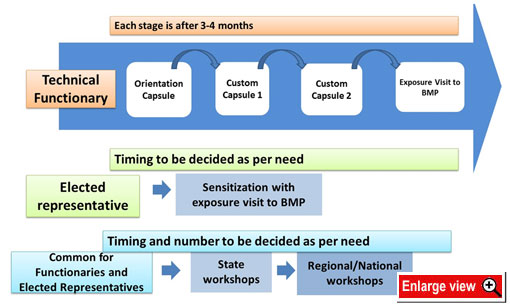CSE as a recognized centre for excellence and training entities has signed MoUs with various states for their capacity building programmes
AMRUT Programme
The mission of AMRUT programme is providing basic services (e.g. water supply, sewerage, urban transport) to households and build amenities in cities which will improve the quality of life for all, especially the poor and the disadvantaged is a national priority.
Therefore, the purpose of AMRUT is to (i) ensure that every household has access to a tap with assured supply of water and a sewerage connection; (ii) increase the amenity value of cities by developing greenery and well maintained open spaces (e.g. parks); and (iii) reduce pollution by switching to public transport or constructing facilities for non-motorized transport (e.g. walking and cycling). All these outcomes are valued by citizens, particularly women, and indicators and standards have been prescribed by the MoHUA in the form of Service Level Benchmarks (SLBs).
Mission focuses on the following Thrust Areas
-
Water Supply,
-
Sewerage facilities and septage management,
-
Storm Water drains to reduce flooding,
-
Pedestrian, non-motorized and public transport facilities, parking spaces, and
-
Enhancing amenity value of cities by creating and upgrading green spaces, parks and recreation centers, especially for children.
Capacity Building Initiative of AMRUT under CBUD
Five hundred cities across the country are taken up under AMRUT emphasizing on capacity building of elected representatives and officials from cities for undertaking the various tasks envisaged under the mission.
Capacity building of Urban Local Bodies (ULBs) - both appointed and elected representatives by training entities (e.g. training institutions, agencies, academic institutes and other not-for-profit organisations) is an imperative component in AMRUT. The purpose of individual capacity building is to enhance functional knowledge, improve the job related skills and bring about a positive change in the attitude of municipal functionaries through need based focused training and visits to the best practices. Training will be imparted to municipal functionaries in training institutes followed by its application at their work place. Additionally, they will be mentored and provided coaching services at their work place during the one-year training period. The Training Needs Assessment (TNA) conducted under the Capacity Building for Urban Development (CBUD) Project will form the basis of the individual training programmes.
CBUD Project aims to help in addressing the major constraints to urban development and specifically focuses on the capacity building requirements for successful urban management and poverty reduction. The main objective of the project is to assist in the following:
-
Assist selected states and urban local bodies to operationalize institutionalize urban reform agenda;
-
Strengthen policy, institutional reform and improve procedures; and
-
Improve skills in the areas of governance, planning, service delivery and municipal financial management.
CSE is a designated Centre of Excellence for MoHUA, Govt. of India for capacity building and mainstreaming reforms/ good practices under CBULB scheme since 2009 conducting capacity building activities. CSE has also been empanelled as training institution in subject area: (i) Engineering & Public Health and (ii) Town Planning - to roll out training programmes in AMRUT cities with funds made available from ongoing CBUD supported by World Bank.
The centre is supporting states/target cities for delivery of individual capacity building programmes such as - Strategic training plan based on TNA, research studies/documentation, exposure visit/workshops/seminar for capacitating municipal functionaries and elected representatives. This would also include coaching and task related assistance from peers / mentors as well as visibility and preparation of IEC materials.
The handholding training will include orientation workshops followed with sectoral innovation and good practices – in water supply, sewerage and septage management, non-motorised transport and other related sectors – waste management, wastewater recycling / reuse etc.
Roll out of AMRUT Programme
| Jharkhand | Andhra Pradesh |
Odisha | Delhi | Uttar Pradesh | ||||||
|
|
|
|
|
|||||||
|
|
||||||||||

Share this article